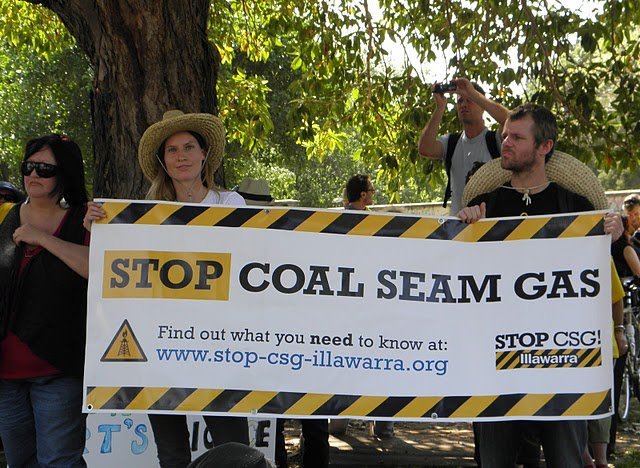
More than 3000 people turned out on October 16 to walk across the Sea Cliff Bridge in the Illawarra in protest against coal seam gas mining plans in the area. The protest was further proof the coal seam gas (CSG) industry is in trouble. Its problem? An informed public.
The Australian said on October 10 that a survey had showed the CSG industry was “losing the PR battle”, with 63% of respondents recalling a negative media story about CSG.
Driving the bad coverage has been the large grassroots campaign against the industry.
The CSG industry has responded to its unpopularity in two main ways. It is carrying out a rapid expansion of drilling to embed the industry in the economy. And it is trying to counter concerns about CSG by blurring the facts and attacking its opponents.
The CSG industry has increasingly resorted to media spin to try to set aside concerns about toxic chemicals, water contamination, destruction of farmland, damage to human health and fire hazards. Its biggest lie is that CSG is a “clean” alternative to coal.
The widely mocked “We Want CSG” ad campaign sponsored by the Australian Petroleum Production and Exploration Association (APPEA) is the most brazen example of this so far. The ads claimed CSG produces “up to” 70% less greenhouse gas emissions than coal.
Matthew Wright of climate solutions research group Beyond Zero Emissions told the October 8 Sydney Morning Herald that CSG was “perhaps 30% cleaner than new black coal-fired plants. After conversion to liquefied natural gas, CSG is likely to prove, at best, marginally cleaner than new coal, and possibly worse”.
APPEA has based its claims of CSG’s “greenness” on a report it commissioned from engineering company WorleyParsons. However, APPEA has refused to release the full report to the public saying the information is a commercial secret.
APPEA also attacked a submission to a Senate inquiry by rural anti-CSG group Lock the Gate by quibbling over small details in order to undermine the entire submission. Lock the Gate spokesperson Drew Hutton told Ninemsn: “APPEA misinterpreted and took out of context parts of Lock the Gate’s submission.”
The CSG industry has also launched personal attacks on anti-CSG campaigners.
The Australian, the NSW Coalition government and APPEA tried to manufacture a scandal on October 11 by targeting campaign group Stop CSG Illawarra for using a post office box shared by several left-wing groups. They also attacked Stop CSG Illawarra members Jess Moore and Chris Williams for being members of the Socialist Alliance.
This clumsy attempt to divide the movement has brought the CSG industry’s propaganda efforts, and their connection with the mainstream media and government, into sharper focus. That people from the left are involved in environment campaigns is hardly news.
Williams told Green Left Weekly the attacks showed CSG supporters were afraid of honest debate.
“The CSG industry is losing this debate,” he said. “And so they should: the facts are not on their side. In a desperate attempt to divide and undermine the community campaign, they're trying to discredit leading campaigners.
“But people in our community can see straight through it. They know the fight to protect our water, health and environment is too important to risk.”
He said the threat of CSG mining had united and empowered a large and diverse group of people who would not have otherwise engaged in activism.
“The stop CSG campaign here is the broadest, deepest and most democratic campaign the Illawarra has seen for many years. The mass participation — not only during actions but also for our 100-plus monthly organising meetings — is testament to this.”
Comments
Anonymous replied on Permalink